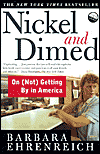"Just let the market provide health care"
Markets do a fine job of allocating investment resources in those areas with the greatest possible profit, but when someone get really sick - cancer for example - where's the profit?Ask any insurance underwriter. The profit is in denying care, not in providing it. As Kevin Drum point out today:
One of the reasons America spends so much more than any other country on healthcare is because upwards of 30% of our expenditures are for paper shuffling by insurance companies doing their best to deny treatment whenever possible. By contrast, administrative costs in countries where there's only one paper shuffler — and it's not trying to make a profit from its shuffling — are closer to 10%.So how does an insurance company which is required by law to not adjust your premiums upward when you get sick able to avoid paying the expenses of your illness?
Cathy Siepp writes a weekly column for National Review Online. Cathy also has cancer. Let's let her tell us:
By law, insurance companies aren't allowed to adjust your monthly premiums just because you get sick. But they can raise the out-of-pocket cap for all of their members anytime they like, which amounts to the same thing because it affects only the unvalued sick members.[Snip]One thing that single payer would change is that the therapies that are covered would be predictable to the physician and the customer. As it is, each insurance company makes different decisions, and except in unusual cases, no one gathers the date across multiple insurance companies to see what works and what doesn't. Each physician and patient is left alone to battle with the insurance company as it denies care.
Policy wonks keep arguing about market competition and consumer choice. But healthcare for the sick isn't a market because choice disappears. You can't shop around for generic drugs when you have cancer. Whatever chemical treatment the doctor suggests, it almost certainly will be a brand name costing several thousand dollars a month.
My out-of-pocket cap is $7,500, which means that after I reach $7,500 in co-payments, Blue Cross pays 100% of my medical expenses for the rest of that year — except for the $30-per-brand-name prescription I have to pay the pharmacy after I reach my $500 annual deductible for drug coverage. According to the policy, it's supposed to be a $30 co-payment for a month's supply, but a new anti-nausea drug I was taking for weekly chemo costs $285 for just three pills, so Blue Cross made me go to the drugstore and fork over $30 every seven days. [Snip]
I began getting letters from Blue Cross in February announcing that it was retroactively disallowing the anti-cancer drug Avastin treatments it had been paying for since October, at $5,000 a pop every other week. It seems Blue Cross decided this new and expensive targeted therapy is experimental.
With single payer, everyone goes under the same rules. If a treatment is denied as experimental, then a number of patients and their physicians can join together to contest the decisions. The physician will also be able to generally determine in advance what treatments will be paid for and what treatments will not. For those known to be not covered, the physicians and patients can begin making alternative choices early in the treatment.
Single payer is not perfect, by a long shot. But it is a lot better for a lot more people than the current system is, and it can cut health costs by the 20% of paper shuffling that is eliminated by underwriters attempting to avoid payment for expensive treatments. That's more than enough to provide universal health care.














0 Comments:
Post a Comment
<< Home